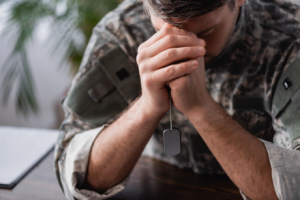Veterans adjusting to civilian life face a unique set of struggles that predispose them to develop a substance use disorder (SUD).1 The presence of a SUD can have significant consequences for mental and physical health, performance at work, ability to maintain housing, and social functioning.2
This page will provide some resources that may help Veterans get past many of the barriers between them and addiction treatment.
Why Don’t Veterans Seek Addiction Treatment?
 There are many reasons why Veterans don’t seek or receive addiction treatment, including:1,3
There are many reasons why Veterans don’t seek or receive addiction treatment, including:1,3
- Limited access to treatment due to location or cost: Not everyone lives close to a VA treatment center. Sometimes, the closest VA center may not be equipped to provide the care they need. Going outside the VA for help—especially when someone does not have private insurance—is often cost-prohibitive.
- Addiction stigma: People with a military background face both internal and external stigmatization of their addictions. As a part of a culture that values self-reliance, Veterans may be less likely to ask for help.
- Apprehension about negative consequences: Consequences may appear at home, at work, or in other areas of life as a person takes time to heal and reconcile any damage done while using.
- Lack of confidentiality: While in the military, there are sometimes breaches of confidentiality, and as civilians, Veterans may fear or have experienced something similar.
While these barriers to treatment are not easy to overcome, the following resources may be able to help:
- Veterans find affordable addiction treatment near them.
- Family members of Veterans better support their loved ones struggling with addiction.
- Veterans struggling with homelessness or near homelessness get assistance.
- Veterans confidentially connect with supportive peers that empathize with what they are going through.
Veteran Rehab Programs by State:
The Mission Act established a new Community Care Program that allows Veterans to seek care at alternate approved facilities if the nearest VA facility is too far away or not equipped to help them.
All American Addiction Centers (AAC) facilities are within the Community Care Network, and each of them offers veteran-specific programs. There are AAC facilities in:
- California: In Aliso Viejo, CA, Laguna Treatment Hospital offers substance use disorder treatment with evidence-based and quality care. They are equipped to treat patients anywhere on the spectrum of recovery, even with medically intensive needs.
- Nevada: Desert Hope Treatment Center in Las Vegas, NV, boasts services ranging from quality medically-assisted detoxification to aftercare in a sober living facility. Fully equipped with all levels of treatment, Desert Hope can accommodate the needs of nearly any patient.
- Texas: Near Dallas, Greenhouse Treatment Center in Grand Prairie, TX, offers Veteran care and specializes in treatment for addiction with co-occurring disorders. A restful place with luxurious amenities, Greenhouse can provide a unique healing environment.
- Florida: River Oaks Treatment Center in Riverview, FL, and Recovery First Treatment Center in Hollywood, FL, offer Veterans the highest standard of evidence-based treatments in beautiful locations.
- Mississippi: Oxford Treatment Center in Etta, MS, is run by a compassionate team of professionals who can tailor treatment plans to each individual. Located in Northern Mississippi, Oxford offers the ability to heal from substance use disorder in a serene, natural environment.
- New Jersey: Sunrise House Treatment Center in Lafayette, NJ, offers an individualized, medically sound approach to evidence-based detox and residential addiction treatment.
- Massachusetts: AdCare Treatment Hospital in Worcester, MA, has offered quality addiction treatment for over 45 years. Their expert staff is well-equipped to meet a variety of needs in both inpatient and outpatient settings and can accept many insurance plans including Medicaid and Medicare.
- Rhode Island: AdCare Rhode Island offers inpatient treatment in North Kingstown, and outpatient facilities in Warwick, Greenville, and South Kingstown.
Call to speak to an admissions navigator at AAC.
Alternatively, you can use the VA Facility Locator tool on the VA website to find a facility close to you. Under “Choose a VA facility type,” select “Community providers.” In the search, include your address and the specialized care you want to access. This tool will help you identify care providers and rehab facilities that are approved by the VA and within the VA network.
Family Support for Veterans Struggling with Addiction
Seeing a loved one struggling with addiction can be extremely difficult. However, support from family and close friends can make the difference between staying in treatment and working through another relapse. Some of the best things a person can do for a loved one struggling with addiction after military service are to:5
- Remember that addiction is a treatable condition.
- Look to family addiction resources for support.
- Have open discussions about family history of substance misuse or mental illness.
- Communicate your care and support to your loved one.
- Have compassion and patience as they go through treatment and begin their recovery.
- Make time for yourself during the process.
Peer support programs, such as Al-Anon and Nar-Anon, can help the loved ones of people recovering from the effects of living with someone struggling with an alcohol or drug problem.
Veteran Addiction Hotlines
Finding help for addiction or in a time of crisis can be daunting. Without knowing where to start, a Veteran struggling with addiction may not want to reach out.
Helpful hotlines for Veterans include:
- Veteran Crisis Line: This hotline is for veterans experiencing a crisis of any type and is available to all Veterans, including those that do not have VA benefits. 1-800-273-8255, option 1.
- Lifeline for Vets: This hotline enables you to speak through another Veteran that may better understand what you are going through. 1-888-777-4443.
For Veterans ready for treatment, our addiction hotline at is staffed by compassionate admissions navigators available 24/7 to help Veterans start treatment at an American Addiction Centers facility today. Conversations with admissions navigators are 100% confidential and protected by the Health Insurance Portability and Accountability Act (HIPAA).
Assistance for Homeless Veterans
 After serving their country, many Veterans have difficulties finding a job and maintaining housing. Inconsistency with housing or employment can make it difficult for Veterans to meet other needs, including healthcare and addiction treatment.
After serving their country, many Veterans have difficulties finding a job and maintaining housing. Inconsistency with housing or employment can make it difficult for Veterans to meet other needs, including healthcare and addiction treatment.
Fortunately, there are assistance programs available for homeless Veterans or those struggling financially. The U.S. Department of Housing and Urban Development offers VA-Supportive Housing (HUD-VASH), which can help with housing costs and help Veterans connect with other resources. Other programs that offer assistance are:7
- Supportive Services for Veteran Families (SSVF).
- Domiciliary Care for Homeless Veterans (DCHV) Program.
- Homeless Veteran Community Employment Services (HVCES).
- Compensated Work Therapy (CWT).
- Health Care for Homeless Veterans (HCHV).
- Homeless Veterans Dental Program.
- Veterans Justice Outreach (VJO).
- Community Resource and Referral Centers (CRRCs).
- VA Vet Centers.
Veterans Treatment Court
The first Veteran Treatment Court was created in 2008 to help Veterans with substance use disorders get quality rehabilitative treatment in lieu of jail sentences, while at the same time protecting public safety.6 The court was a huge success, prompting expansions and the Veterans Treatment Court Coordination Act of 2019. The program works with state, local, and tribal judicial systems to ensure that involved Veterans receive:6
- Evidence-based care.
- Mandatory drug testing.
- Promised incentives or sanctions.
- Ongoing recovery support services.
Drug & Alcohol Treatment for Veterans
Drug and alcohol addiction are both significant problems in the Veteran community.1 Problematic substance use most often occurs from heavy episodes of drinking alcohol, but the rates of misuse of opioids and other prescription drugs among Veterans have been rising.1
Since Veterans face unique struggles regarding substance use, many Veterans can benefit from enrolling in a Veteran-specific program.
For example, suffering from addiction and other illnesses—often referred to as co-occurring disorders, dual diagnosis, or comorbidities—is a significant problem among Vets. Nearly 20% of Veterans who returned from Iraq and Afghanistan suffered from post-traumatic stress disorder (PTSD), depression, or traumatic brain injury.2
Research shows that simultaneous treatment for these conditions along with substance use is much more effective than treating each condition separately. Veteran-specific treatment programs are equipped to handle this, and patients benefit from being surrounded by peers in similar situations.
Veteran Addiction Treatment at AAC
If you or a loved one are a Veteran struggling with addiction, American Addiction Centers (AAC) can help you start your journey to recovery. Each AAC facility across the country offer the highest-quality and evidence-based care and specialized programs for Veterans.
Call to talk to an admissions navigator at AAC to learn more about types of addiction treatment, ways to pay for rehab, and verify your insurance covers rehab at an AAC facility. Compassionate admissions navigators are available 24/7 to guide you through the treatment admissions process and help you begin your road to recovery.
You can also verify your insurance coverage at AAC facilities by completing the confidential online form below.
